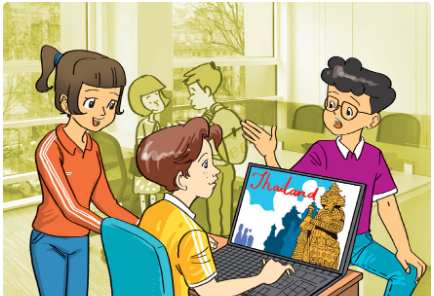Bài học cùng chủ đề
Báo cáo học liệu
Mua học liệu
Mua học liệu:
-
Số dư ví của bạn: 0 coin - 0 Xu
-
Nếu mua học liệu này bạn sẽ bị trừ: 2 coin\Xu
Để nhận Coin\Xu, bạn có thể:

Luyện tập SVIP
Listen and read
|
Phong: Hey, you've been in front of your computer for so long! What are you looking for? Kevin: Well, I've been searching for information about further education for several days and I've learnt a lot about it from different websites. Phong: What is further education? Kevin: It's basically education below degree level for people above school age. It can be academic or vocational. Maria: Sounds interesting! How are they different? Kevin: Academic courses help us develop analytical skills, critical thinking and knowledge for higher education at a university or college Phong: Will that lead to a bachelor's degree? Kevin: Exactly. That's the undergraduate level. At the postgraduate level, you get a master's degree, or a doctoral degree. A doctoral degree, also called a doctorate or PhD, is the highest university degree.
|
Maria: I see. What about vocational courses? Kevin: They provide us with practical skills, training and qualifications to succeed in a particular job. Maria: OK. So, what are your plans for the future? Kevin: I've been thinking about studying abroad lately. Besides improving my language skills, I can learn more about other cultures. It can be exciting. Phong: And more expensive... Kevin: But we can apply for scholarships. Maria: Well, I may need more time to decide on my major so I won't go straight to university after school. Kevin: Good idea! Many students prefer to take a gap year between secondary school and college so they can do voluntary work or internships, and travel. Maria: I couldn't agree more. I've travelled to quite a few countries since grade 9. Next year I plan to go to Thailand to work as a volunteer at a children's home. I hope the practical experience will make my CV look good. Phong: Sounds great! I'd like to join you if I can. I've have never been to Thailand before. |
Để kéo thả vào ô trống, các bạn có thể thao tác như sau.

Complete each sentence with the words in the box.
1. Further education institutions offer courses to students.
2. Higher education can be divided into two levels: .
3. When finishing an undergraduate course successfully, students can get .
4. Students who need practical skills and want to prepare for a job or profession should take .
5. Students who want to receive an amount of money to help them pay for their education can .
(Kéo thả hoặc click vào để điền)
|
Phong: Hey, you've been in front of your computer for so long! What are you looking for? Kevin: Well, I've been searching for information about further education for several days and I've learnt a lot about it from different websites. Phong: What is further education? Kevin: It's basically education below degree level for people above school age. It can be academic or vocational. Maria: Sounds interesting! How are they different? Kevin: Academic courses help us develop analytical skills, critical thinking and knowledge for higher education at a university or college Phong: Will that lead to a bachelor's degree? Kevin: Exactly. That's the undergraduate level. At the postgraduate level, you get a master's degree or a doctoral degree. A doctoral degree, also called a doctorate or PhD, is the highest university degree.
|
Maria: I see. What about vocational courses? Kevin: They provide us with practical skills, training and qualifications to succeed in a particular job. Maria: OK. So, what are your plans for the future? Kevin: I've been thinking about studying abroad lately. Besides improving my language skills, I can learn more about other cultures. It can be exciting. Phong: And more expensive... Kevin: But we can apply for scholarships. Maria: Well, I may need more time to decide on my major so I won't go straight to university after school. Kevin: Good idea! Many students prefer to take a gap year between secondary school and college so they can do voluntary work or internships, and travel. Maria: I couldn't agree more. I've travelled to quite a few countries since grade 9. Next year I plan to go to Thailand to work as a volunteer at a children's home. I hope the practical experience will make my CV look good. Phong: Sounds great! I'd like to join you if I can. I've never been to Thailand before. |
Read the conversation again and answer the questions.
1. What can students do after leaving secondary school?
2. In what way do academic courses help students?
3. Why do some students prefer not to go to university immediately after leaving secondary school?
4. What are some advantages of taking a gap year?
Your plans after leaving secondary school?
Example:
I'd like to work in a business environment, so I will choose business administration as my major. After graduating from secondary school, I will take some Business English courses and I will also work on my presentation skills.



Bạn có thể đánh giá bài học này ở đây